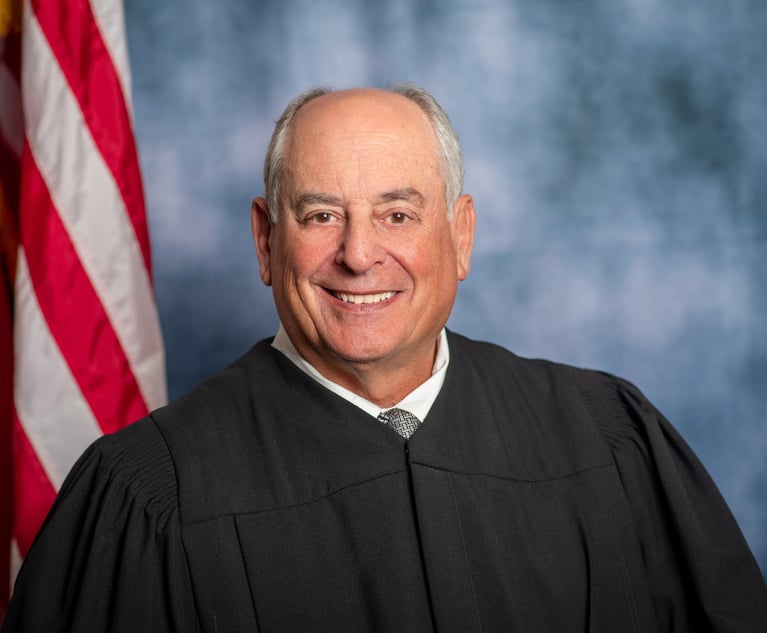 Judge Brian Rickman, Georgia Court of Appeals. (Photo: John Disney/ ALM)
Judge Brian Rickman, Georgia Court of Appeals. (Photo: John Disney/ ALM)Appeals Court Says State Can Prosecute Charges Dropped as Part of Federal Plea Deal
The Georgia Court of Appeals reversed a trial judge and its own precedent, ruling that charges dismissed by federal prosecutors in a plea deal did not amount to an "acquittal" of similar charges in state court.
June 26, 2020 at 04:41 PM
5 minute read
The Georgia Court of Appeals reversed a trial judge and its own precedent in ruling that a man who struck a plea deal with federal prosecutors for trafficking methamphetamine is not immune from prosecution on the same charges in state court.
Friday's opinion, written by Judge Brian Rickman with the concurrence of Judges Stephen Dillard and E. Trenton Brown III, overruled a "rather inartfully worded" decision from 1988 that a dismissal of a criminal charge as a result of a plea agreement amounted to an "acquittal" under Georgia's statute barring successive prosecutions for the same offense under state and federal law.
The case involves the 2017 arrest and indictment of Samuel Adams on several charges, including trafficking in methamphetamine.
Adams pleaded not guilty and was placed on the trial calendar, but in the meantime he was indicted by federal prosecutors in Georgia's Middle District for charges including possession of meth with intent to distribute and possession of a firearm by a convicted felon.
Federal prosecutors agreed to drop the meth charges in return for a guilty plea to the firearm count, and "the plea was given 'in full satisfaction of all possible federal criminal charges, known to the United States Attorney at the time of [Adams's] guilty plea,'" according to the opinion.
Adams then filed a plea seeking dismissal of the state charges based on a Georgia's statute decreeing that a "prosecution is barred if the accused was formerly prosecuted for the same crime based upon the same material facts" and "resulted in either a conviction or an acquittal."
Judge Lawton Stephens granted the motion, "concluding that the federal prosecutor's dismissal of the drug charge in accordance with a plea agreement 'acts as an acquittal and bars further prosecution'" under the statute, the opinion said.
In reversing Stephens, Rickman noted that both the United States and Georgia constitutions prohibit anyone being "put in jeopardy" twice for the same offense.
"States are sovereigns separate from the federal government, however, 'and a state's power to undertake criminal prosecutions is derived from its own inherent sovereignty,'" Rickman wrote, citing the Georgia Supreme Court's 2018 decision in Calloway v. State.
"No one disputes in this case that the state was not constitutionally barred under the dual sovereignty doctrine from prosecuting Adams for trafficking methamphetamine merely because the federal government elected not to do so in accordance with the terms of a plea agreement," the opinion said.
Nonetheless, said Rickman, the Georgia statute does bar successive federal and state prosecutions "'for a crime which is within the concurrent jurisdiction of this state if such former prosecution resulted in either a conviction or an acquittal and the subsequent prosecution is for the same conduct, unless each prosecution requires proof of a fact not required in the other prosecution or unless the crime was not consummated when the former trial began.'"
The only issue in this case, said Rickman, is whether the dismissal of the federal drug charge constituted an "acquittal."
Stephens had relied on the court's 1988 ruling in State v. Smith, in which a drunk-driving defendant facing four counts pleaded guilty to two in exchange for dropping the others.
After the court accepted the plea, the solicitor said his assistant had made a mistake and attempted to prosecute one of the dismissed charges.
The 1988 opinion said the trial transcript "unequivocally reflects that appellee/defendant entered a plea of guilty to two counts, as above discussed, and that this plea was duly accepted."
The trial judge in that case was correct to consider the other counts barred by double jeopardy, the 1988 court ruled.
In Friday's opinion, Rickman said that decision and similar cases "unnecessarily conflate the constitutional protection of double jeopardy with the statutory protections against successive prosecution offered by OCGA 16-1-8."
"Specifically," he wrote, "Smith predicated the application of OCGA 16-1-8 (b) on a defendant having first been 'placed in jeopardy,' relying on case law that injected jeopardy into the definition of prosecuted' for the purposes of the statute."
But nothing in the statute "predicates the application of its provisions on the attachment of jeopardy," Rickman wrote. "Rather, pertinent to our holding, the bar is established if an accused was formerly prosecuted' and … the prosecution resulted in 'either a conviction or an acquittal.'" "Simply put, jeopardy plays no part in the determination of whether a successive prosecution is statutorily barred" by the law, he said.
"For these reasons, we overrule Smith to the extent that it can be read to stand for the proposition that the dismissal of a criminal charge amounts to an 'acquittal' for the purposes of OCGA 16-1-8, and further overrule Smith, its progeny, and the cases in which it has been cited" in support of that proposition, Rickman said.
Assistant Athens-Clarke County District Attorney Reid Peacock said via email that opinion was an important clarification of court regarding the "meaning and scope of O.C.G.A. 16-1-8, as it relates to successive prosecutions by state and federal governments, and preserves the State of Georgia's authority to enforce its criminal laws."
Adams' attorney, Athens-Clarke County Assistant Public Defender Kelly Wegel, was not available on Friday.
This content has been archived. It is available through our partners, LexisNexis® and Bloomberg Law.
To view this content, please continue to their sites.
Not a Lexis Subscriber?
Subscribe Now
Not a Bloomberg Law Subscriber?
Subscribe Now
NOT FOR REPRINT
© 2024 ALM Global, LLC, All Rights Reserved. Request academic re-use from www.copyright.com. All other uses, submit a request to [email protected]. For more information visit Asset & Logo Licensing.
You Might Like
View All
Georgia Supreme Court Honoring Troutman Pepper Partner, Former Chief Justice
2 minute read
'A 58-Year-Old Engine That Needs an Overhaul': Judge Wants Traffic Law Amended
3 minute read
Appeals Court Removes Fulton DA From Georgia Election Case Against Trump, Others
6 minute read
Family of 'Cop City' Activist Killed by Ga. Troopers Files Federal Lawsuit
5 minute readTrending Stories
- 1Clifford Chance Hikes Partner Pay as UK Firms Fight to Stay Competitive on Compensation
- 2Judicial Conduct Watchdog Opposes Supreme Court Justice's Bid to Withdraw Appeal of Her Removal
- 3Lessons in Mediation & Negotiation: Attorneys' Reflections on Jimmy Carter
- 4Legal Issues to Watch in the US Appeals Courts in 2025
- 5Ex-MoviePass CEO Submits to Ban, Settling SEC Allegations
Who Got The Work
Michael G. Bongiorno, Andrew Scott Dulberg and Elizabeth E. Driscoll from Wilmer Cutler Pickering Hale and Dorr have stepped in to represent Symbotic Inc., an A.I.-enabled technology platform that focuses on increasing supply chain efficiency, and other defendants in a pending shareholder derivative lawsuit. The case, filed Oct. 2 in Massachusetts District Court by the Brown Law Firm on behalf of Stephen Austen, accuses certain officers and directors of misleading investors in regard to Symbotic's potential for margin growth by failing to disclose that the company was not equipped to timely deploy its systems or manage expenses through project delays. The case, assigned to U.S. District Judge Nathaniel M. Gorton, is 1:24-cv-12522, Austen v. Cohen et al.
Who Got The Work
Edmund Polubinski and Marie Killmond of Davis Polk & Wardwell have entered appearances for data platform software development company MongoDB and other defendants in a pending shareholder derivative lawsuit. The action, filed Oct. 7 in New York Southern District Court by the Brown Law Firm, accuses the company's directors and/or officers of falsely expressing confidence in the company’s restructuring of its sales incentive plan and downplaying the severity of decreases in its upfront commitments. The case is 1:24-cv-07594, Roy v. Ittycheria et al.
Who Got The Work
Amy O. Bruchs and Kurt F. Ellison of Michael Best & Friedrich have entered appearances for Epic Systems Corp. in a pending employment discrimination lawsuit. The suit was filed Sept. 7 in Wisconsin Western District Court by Levine Eisberner LLC and Siri & Glimstad on behalf of a project manager who claims that he was wrongfully terminated after applying for a religious exemption to the defendant's COVID-19 vaccine mandate. The case, assigned to U.S. Magistrate Judge Anita Marie Boor, is 3:24-cv-00630, Secker, Nathan v. Epic Systems Corporation.
Who Got The Work
David X. Sullivan, Thomas J. Finn and Gregory A. Hall from McCarter & English have entered appearances for Sunrun Installation Services in a pending civil rights lawsuit. The complaint was filed Sept. 4 in Connecticut District Court by attorney Robert M. Berke on behalf of former employee George Edward Steins, who was arrested and charged with employing an unregistered home improvement salesperson. The complaint alleges that had Sunrun informed the Connecticut Department of Consumer Protection that the plaintiff's employment had ended in 2017 and that he no longer held Sunrun's home improvement contractor license, he would not have been hit with charges, which were dismissed in May 2024. The case, assigned to U.S. District Judge Jeffrey A. Meyer, is 3:24-cv-01423, Steins v. Sunrun, Inc. et al.
Who Got The Work
Greenberg Traurig shareholder Joshua L. Raskin has entered an appearance for boohoo.com UK Ltd. in a pending patent infringement lawsuit. The suit, filed Sept. 3 in Texas Eastern District Court by Rozier Hardt McDonough on behalf of Alto Dynamics, asserts five patents related to an online shopping platform. The case, assigned to U.S. District Judge Rodney Gilstrap, is 2:24-cv-00719, Alto Dynamics, LLC v. boohoo.com UK Limited.
Featured Firms
Law Offices of Gary Martin Hays & Associates, P.C.
(470) 294-1674
Law Offices of Mark E. Salomone
(857) 444-6468
Smith & Hassler
(713) 739-1250






